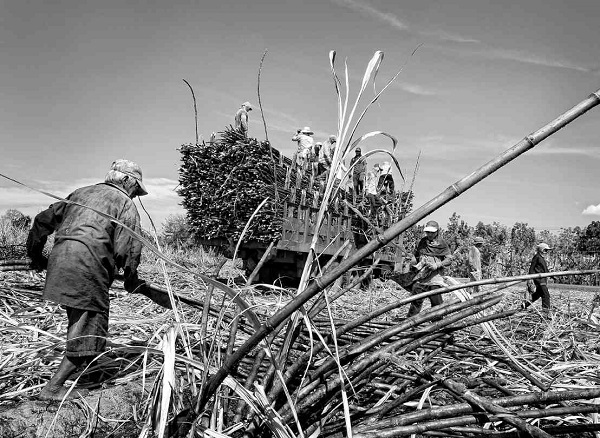
A FARM WORKER loads sugarcane onto a truck in Tarlac province unsure if he will still have work after the sugarcane harvest season and amid the changing realities of farming as a result of climate change. AL BENAVENTE / CONTRIBUTOR
LUCENA CITY—The government should now pour more funding assistance to the country’s agricultural workers to protect them from the relentless threat posed by destructive weather.
“Our crops are now more vulnerable to destruction with these frequent strong typhoons and flash floods. God forbid, if that happened in my farm, I don’t know who to turn to,” said farmer Glicerio Rosas from General Luna town in an interview while he was buying farm tools here in Lucena on Thursday.
A companion, Cesar Alvaro, recalled how a strong typhoon in 2009 destroyed his vegetable farms, which forced his two high school children to stop schooling due to lack of money.
“They were forced to help me in the farm. I borrowed money from an Indian money lender to help my family survive the catastrophe,” he said.
The two farmers said the government should immediately provide farmers, who are typhoon victims, with easy access to cash assistance to rebuild their farms.
According to the Department of Agriculture (DA), Typhoon “Santi” destroyed more than P2.9 billion worth of crops and other agricultural products in Central Luzon.
An estimated P2 billion worth of palay were also rendered worthless after being damaged by the typhoon.
Agriculture Undersecretary Dante S. Delima earlier said Santi destroyed 133,000 metric tons (MT) of palay, which was equivalent to 15 percent of the total rice production in the region during the third quarter.
Amid the destruction wrought by Santi and the effects of climate change, a party-list group sought new laws to improve agriculture financing.
In a bill entitled, “Revised Charter of the Philippine Crop Insurance Corporation (PCIC) Act of 1995”, the party-list group Coop-Natcco sought “better allocation of financial resources in the agriculture sector.”
Anthony Bravo, who represents Coop-Natcco in the House, said the bill would increase property insurance for crops.
It would require the PCIC to pay between 80 to 100 percent of the actual value of farmers’ projected harvest in case of losses due to calamities.
The bill would also require government to subsidize insurance premiums of up to 50 percent for grains.
“The problem with the PCIC is that it has continually failed to adequately protect our subsistence farmers from the rigors of calamities, often paying far less than what the actual value of the projected harvest is,” said Bravo in a statement.
“It is only by properly compensating the farmers will we fully protect their interest and those of their families,” he said.
Bravo has also authored a bill amending the Agricultural Competitiveness Enhancement Fund (Acef), allocating 10 percent of its proceeds to the PCIC.
The law the created Acef transfers to it tariffs from imported agricultural products. Funds in Acef are meant for farm-to-market roads, postharvest equipment and facilities and other forms of assistance to the agricultural sector.
Funds that go to Acef, however, have been drastically reduced as the National Food Authority (NFA) resorted to importing rice itself instead of allowing the private sector to do so.
In 2013 alone, rice importation by the private sector fell from 76 percent to 3 percent of total rice importation. The NFA, on the other hand, doubled its importation from 120,000 MT in 2012 to 205,700 MT this year.
The NFA paid at least P1.7 billion in duties and taxes for the importation of rice through government-to-government transactions.
The agency spent more than P4 billion to import rice from Vietnam in April this year. Despite the importation, however, supply remained tight and prices high.